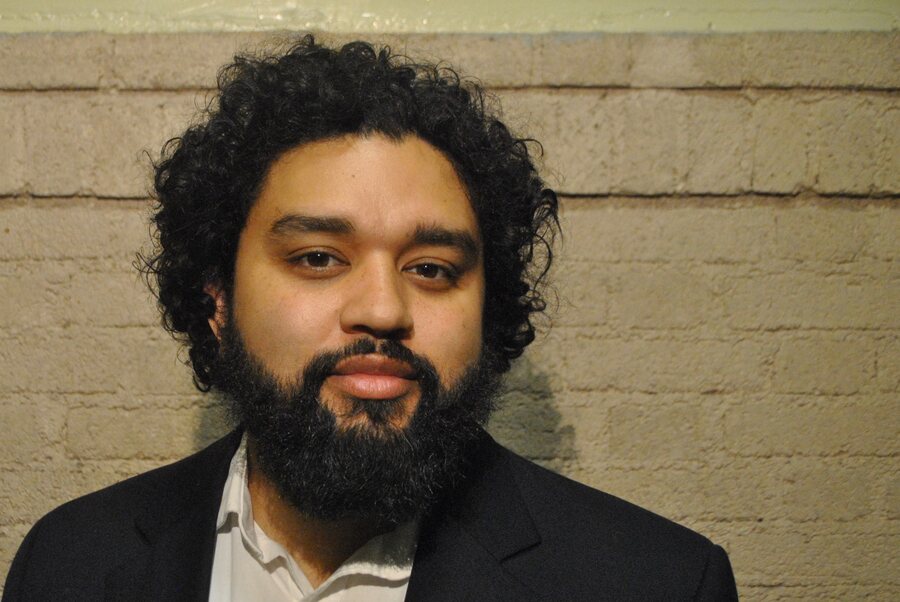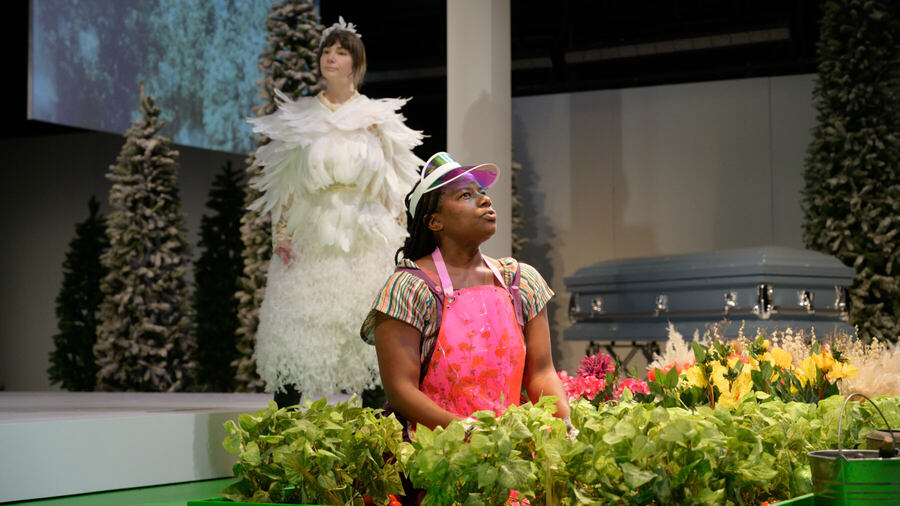Nathan Alan Davis is having a very busy 2023. Mention that busy year to his friends, collaborators, or students, and one word keeps cropping up: overdue.
The 43–year-old playwright has already received three world premiere productions this year: The High Ground, at Washington, D.C.’s Arena Stage in February, Eternal Life: Part 1 at Philadelphia’s Wilma Theater in April, and Origin Story at Ohio’s Cincinnati Playhouse in the Park in May.
The fourth, his most ambitious, is The Refuge Plays, a three-part epic tracing multiple generations of a Black family living a secluded existence deep in the woods of southern Illinois, and it begins previews Sept. 16 at the Laura Pels Theatre in New York. Presented by Roundabout Theatre Company in association with New York Theatre Workshop, the epic work spans 70 years and runs three-and-a-half hours, with two intermissions.
In a period of industry belt-tightening, The Refuge Plays is a remarkable commitment by two major Off-Broadway companies to an expansive, 10-actor piece by a playwright with relatively little name recognition. Davis has had only one previous New York production, Nat Turner in Jerusalem, a two-hander dramatizing the slave rebellion leader’s final night in jail before his execution, which New York Theatre Workshop staged in 2016.
Yet Davis’s banner year, and the two theatres’ commitment to Refuge, speak to the high regard in which he is held. And the range of this year’s four plays—each lyrical and poetic in voice but disparate in tone, style, and theme—demonstrate Davis’ wide-ranging skill as a dramatist.
“In all these different worlds, his work comes from a place of confidence and curiosity,” said Anna Morton Stacey, Roundabout’s former literary manager and the show’s dramaturg, who was instrumental in Refuge being programmed (she’s now associate artistic director at Ars Nova). “His writing is self-assured in all genres.”
“I’m so happy that he gets to have this moment of his voice really being uplifted at all these different places,” said Morgan Green, co-artistic director of the Wilma, who directed Eternal Life: Part 1.
For his part, Davis shrugs off the fickle and often slow-burn nature of season scheduling and new-play development, characterizing his packed year as a mix of happenstance and catch-ups after COVID-forced delays.
“It is four different journeys that all culminated at the same time,” he said in a recent interview. Warm and contemplative, if at times uncomfortable explicating the meaning of his work, Davis took long pauses to stroke a large beard as he considered each answer. High Ground, he pointed out, was originally scheduled for Arena Stage’s 2020-21 season, while The Refuge Plays was first set to premiere at McCarter Theatre Center in May 2020.
Davis began work on The Refuge Plays eight years ago. Then a one-act entitled Protect the Beautiful Place (now the title of the play’s first act), Davis developed it as a playwriting student at Juilliard, where he earned a post-master’s artist diploma following completion of an MFA in Playwriting at Indiana University Bloomington. He wasn’t initially planning a trilogy, but fellow students wanted to hear more from the characters. Davis ultimately shaped a three-part tale tracing the family’s history backwards in time: The first act is set in the present day, the second in the 1970s, and the third in the ’50s.
As The Refuge Plays begins, the household’s de facto head, Gail, is visited by the ghost of her husband (known in the play as “Walking Man”), who informs her that she will die the following night. This pronouncement destabilizes the family’s strange, delicate existence in the woods, where they exist at an arm’s length from modern life. Later acts trace the story of how the family’s secluded existence first came to be.
“You go from the fruit of this family to the root of this family,” said Davis, borrowing a line from one of the play’s cast members, Daniel J. Watts (nominated for a Tony for playing Ike Turner in Tina).
There are “remnants” of his own family in the play, Davis said. He grew up in Rockford, in the northern part of Illinois, but has relatives who lived in Southern Illinois. But by placing the action at a halfway-remove from society, Davis gave himself the space for a broader study of what a Black family passes down through the generations.
“It can be hard to step outside of the constant stream of action, information, events that are happening to find out who we really are,” said Davis. “So in that way, the play is creating an alternate reality. But it’s still in conversation with now. They live in their own world, but they also live in a larger world.”

If there is a throughline among Davis’ four plays this year, it is the dreamlike quality of a world just adjacent to our own: an unconscious space somewhere between reality and a more absurdist realm, which allows Davis to comment on the made-up rules humans impose on a cruel, arbitrary existence.
“Some parts feel very grounded, very rooted,” said director Patricia McGregor of The Refuge Plays, which kicks off her ambitious first season as the new artistic director of New York Theatre Workshop. “There are other things that touch at the more mystical, miraculous elements that we try to put words around, that we try to understand.”
Davis used metatheatricality to similar effect in The High Ground, in which a Black soldier guards Standpipe Hill in present-day Tulsa, above the site of the 1921 Tulsa Race Massacre, while a young woman who visits the soldier in various guises attempts to lure him away from death. The play seems to take place both in the present and the past, or perhaps out of time altogether, while fourth-wall breaks suggest two frustrated performers trapped in narrative cycles of violence they are desperate to subvert.
Eternal Life: Part 1 is a science fiction piece, finding its alternate reality in an imagined future where a potion can extend the human lifespan by 50 years. Among the play’s non-human characters are a goose who ponders the meaning of life and a family of snowflakes who debate huge philosophical questions while falling toward their doom.
And in Origin Story, Davis takes a comedic approach, following an adrift 30-something, Margaret, as she juggles jobs at an office and a drive-thru and struggles to form connections in an ever more bizarre world. Each scene throws a new absurdity at her: co-workers referring to paper jams as an “Urgent Margaret,” constant probing inquiries about her racial background, a drive-thru customer announcing she is her long-lost mother.
The plays have little in common outside an often strange and dreamlike nature. Indeed, Davis demurs on drawing any particular parallels among them.
“I’m aware that as a playwright, a big part of what allows you to sustain a presence in the field is an identifiable voice,” he said. After a pause, he could only add: “You’re seeing a very different part of my subconscious with each play.”
That versatility is precisely what draws many of Davis’s collaborators to his work.
“It doesn’t surprise me that he wouldn’t be able to clearly state a throughline, because it’s not like he sits down with a theme,” said Green. “It’s coming from a way more intuitive realm than might be able to be defined.”

In The Refuge Plays, ghosts exist freely alongside the living. Their otherness is barely commented upon, suggesting not some intrusion onto the mortal plane but rather a recognition of the doubtful boundaries we place around what is known and unknown. McGregor noted that in her hometown of St. Croix, Virgin Islands, the presence of spirits can be noted as casually as one would point out a dog crossing the street.
“For some people that’s literal, and for some people that’s metaphorical,” she said.
If the four plays share anything else in common, it is a cautiously hopeful outlook on the future—albeit one informed closely by history. As a professor, formerly at Princeton for seven years and now as head of the MFA Playwriting Program at Boston University, Davis is familiar with the challenges facing young people entering both the theatre profession and the larger economy. But he seeks always to place those struggles in a larger context, while allowing space for his students to think bigger.
“My focus recently has been, how can I try to connect my students with that history of playwriting and storytelling in the world, which is ancient?” said Davis. “I want to remind writers of their part in a long, ancient lineage. They are carrying something forward that’s really precious.”
Davis’s former student Emma Watkins said that he created an environment in his class in which he sought to set professional realities—the kind that might discourage writing as sprawling a piece as Refuge—to the side.
“In the midst of an industry that values speed and sharpness, Nathan helped me to realize the value in taking one’s time, paying close attention, and choosing one’s words with care and respect,” said Watkins. “Which of course, is the hallmark of both a brilliant teacher and playwright.”
McGregor hopes that the gesture of The Refuge Plays might create a similar space, allowing audiences to immerse themselves in one of Davis’s particular worlds, and, in following a vast intergenerational tale, consider not only our history but also how we can move forward.
“In the last few years, we’ve gone into pieces that are in the center of the storm but don’t necessarily get out on the other side,” said McGregor. In Davis’s play, though, “I feel like there’s a pathway for what the other side might look like. What we might dream toward.”
“Writing a play is inherently optimistic,” said Davis. “I don’t think you have to be unaware of the depth of suffering in the world to have hope.
“We have to write ourselves into whatever future we want.”
Joey Sims (he/him) has written for The Brooklyn Rail, Vulture, Into, Queerty, TheaterMania, New York Theatre Guide and TDF Stages. Joey is an alumnus of the Eugene O’Neill Theater Center’s National Critics Institute and runs a theatre Substack called Transitions.





